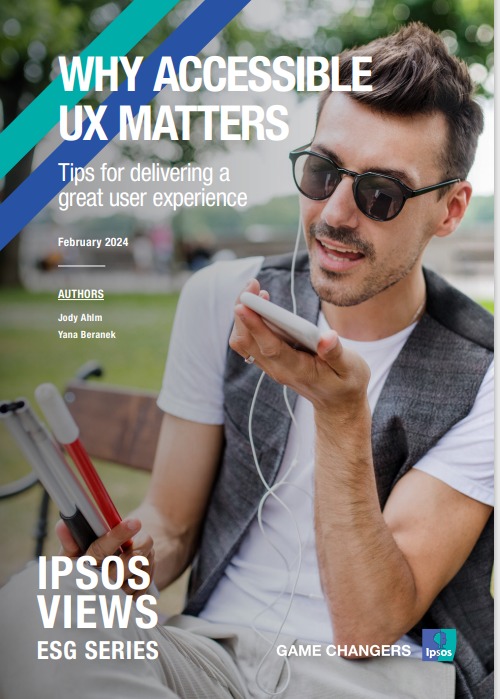Why Accessible UX Matters
 Our Ipsos Views paper, Why Accessible UX Matters, examines the importance of accessibility in user experience (UX) – an area that is moving from ‘nice to have’ to ‘must have’ for brands and organisations.
Our Ipsos Views paper, Why Accessible UX Matters, examines the importance of accessibility in user experience (UX) – an area that is moving from ‘nice to have’ to ‘must have’ for brands and organisations.
Providing accessible design for people with disabilities, including the world's ageing population, is a growing market. People with disabilities have considerable purchasing power, so inclusive design can significantly increase a brand's market share while demonstrating its commitment to diversity and inclusion. In addition, accessible UX simplifies the user experience and appeals to a wide range of users, as demonstrated by features such as speech-to-text technology and hands-free voice control.
Download the POV to discover key learnings from our Ipsos UX team, including:
- Why accessible UX is so important and three key reasons to make it a priority.
- What things to consider when designing to support assistive technology.
- Advice for conducting accessibility research and how to make it successful.
- How to get started with accessible UX.
We also present a recent case study on the online job search experience for users with disabilities. Ensuring that the online job search and application process are accessible has huge implications for the wellbeing and security of people with disabilities. The results of our study reveal some key learnings, including around the design, navigation and language used on websites.
How Ipsos can help with UX for people with disabilities
Our Ipsos UX team is experienced in conducting user testing with people who use assistive technology. We use in-depth face-to-face and remote interviews with users who have a wide range of disabilities, including blind and low vision users, d/Deaf or hard of hearing users and users with cognitive impairments.
We also help clients build accessibility panels, providing a community of participants tailored to answer accessibility questions and supporting our clients in designing and conducting research with these users.
Take a look at our full range of UX capabilities or get in touch if you would like to know more about our services around accessible UX research and design.



